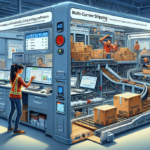Bizerba DWS vs Mettler Toledo CSN840: An In-Depth SEO Optimized Comparison
Weighing scales are indispensable in modern industrial processes, ensuring precise measurement of products essential for quality control, inventory management, and cost efficiency. Among the leading options in the market, the Bizerba DWS and the Mettler Toledo CSN840 stand out for their reliability and advanced features. This article offers an in-depth comparison of these two weighing systems to help you determine which best aligns with your business requirements.
Importance of Weighing Scales in Industrial Operations
Weighing scales play a pivotal role across diverse industrial sectors, including food production, chemical manufacturing, packaging, and logistics. Accurate and dependable weight measurements are critical for:
- Quality Control: Ensuring products meet predefined weight standards to maintain consistency and customer satisfaction.
- Inventory Management: Tracking product quantities effectively to optimize stock levels and reduce shortages or overstock situations.
- Cost Efficiency: Minimizing material waste and preventing overfilling or underfilling, thereby reducing costs associated with product giveaways and compliance penalties.
Furthermore, precise weighing contributes to workplace safety by preventing equipment overloading and ensuring vehicles are not burdened beyond their capacity, which is crucial for reducing accidents and maintaining regulatory compliance. According to a recent ANSI report, accurate weighing systems can reduce material waste by up to 15%, significantly impacting a company's bottom line.
By implementing accurate weighing systems, companies can also enhance sustainability efforts. Optimal measurement of raw materials leads to better resource utilization, reducing environmental impact and promoting cost savings.
Detailed Comparison of Bizerba DWS and Mettler Toledo CSN840
Both the Bizerba DWS and Mettler Toledo CSN840 are high-performance weighing solutions, each offering unique features tailored to specific industrial needs.
Bizerba DWS
- Weighing Capacity: Up to 120 kg, suitable for heavier applications.
- Resolution: High precision with a resolution of up to 1g.
- Connectivity: Offers Ethernet, USB, and Wi-Fi options, facilitating seamless integration with existing systems.
- Durability: Constructed with robust stainless steel, ensuring resistance to corrosion and durability in harsh environments.
- Software: User-friendly interface allowing customization of weighing processes and efficient data management.
Mettler Toledo CSN840
- Weighing Capacity: Up to 1200 g, ideal for precision-heavy applications.
- Resolution: Superior precision with a resolution of up to 0.1g.
- Connectivity: Standard RS-232 and Ethernet options, with potential for cloud connectivity.
- Durability: Features a lightweight aluminum frame, suitable for environments where ease of handling is prioritized.
- Software: Offers an advanced but more complex interface, allowing extensive customization and data analysis capabilities.
Key Features Impacting Industrial Operations
Maintenance and Calibration
The Bizerba DWS is designed for minimal maintenance, featuring reduced washing times during clean-up procedures. Regular calibration checks are essential to maintain its accuracy. In contrast, the Mettler Toledo CSN840 includes a unique calibration feature that simplifies routine calibration, ensuring consistent precision with less effort. According to NIST guidelines, regular calibration can improve measurement accuracy by up to 20%.
Software and Integration
Software plays a crucial role in optimizing weighing processes. The Bizerba DWS boasts a user-friendly interface that simplifies operation, while the Mettler Toledo CSN840's more advanced software allows for extensive customization, catering to complex operational needs. Connectivity is another vital aspect. The Bizerba DWS supports multiple connectivity options, including printers and computers, facilitating easy integration into existing workflows. The Mettler Toledo CSN840 excels with cloud connectivity capabilities, enabling real-time data analysis and remote monitoring, which are increasingly valuable in today's interconnected industrial environments.
Choosing the Right Weighing Scale for Your Business
Selecting the appropriate weighing scale involves evaluating several critical factors:
- Intended Application: Determine whether the scale will be used for heavy-duty or precision applications.
- Weighing Capacity: Ensure the scale's capacity aligns with the maximum weight of products handled.
- Resolution: Higher resolution is necessary for applications requiring precise measurements.
- Connectivity Options: Consider how the scale will integrate with your current systems and future technological expansions.
- Scalability: Choose a scale that can adapt to your business's growth and evolving needs.
Additionally, assessing the required level of accuracy is paramount. A higher resolution scale, like the Mettler Toledo CSN840, is essential for operations demanding meticulous precision, whereas the Bizerba DWS may suffice for applications where capacity is a higher priority.
Pros and Cons of Bizerba DWS and Mettler Toledo CSN840
Understanding the strengths and limitations of each scale can guide informed purchasing decisions.
Bizerba DWS
- Pros:
- High durability with stainless steel construction.
- Extensive connectivity options.
- User-friendly software interface.
- Affordable for budget-conscious businesses.
- Compact size ideal for limited workspace.
- Cons:
- Lower maximum capacity may limit application scope.
- Resolution may not meet ultra-precision requirements.
Mettler Toledo CSN840
- Pros:
- Superior resolution for high-precision measurements.
- Advanced software for extensive customization and data analysis.
- Larger maximum capacity suitable for heavier items.
- Cloud connectivity for real-time monitoring.
- Cons:
- Higher cost may be prohibitive for some businesses.
- Complex interface requiring more extensive training.
- Less durable aluminum frame compared to stainless steel options.
Technological Advancements and Future Trends
Technological innovations are continually enhancing the capabilities of industrial weighing scales. The integration of Artificial Intelligence (AI) and Machine Learning (ML) algorithms is improving measurement accuracy and reducing human error. These technologies enable scales to adapt to varying conditions and predict maintenance needs, thereby minimizing downtime.
Advancements in connectivity, such as Internet of Things (IoT) integration, allow for real-time data collection and analysis, facilitating better decision-making and operational efficiency. Additionally, modern scales feature more intuitive user interfaces with touchscreens and customizable displays, enhancing user experience and reducing training time. According to a Forbes article, the global industrial scales market is expected to grow by 5.2% annually through 2028, driven by these technological advancements.
As these technological trends continue to evolve, industrial weighing scales will become even more integral to streamlined and efficient manufacturing and logistics processes.
Customer Reviews and Satisfaction Rates
Customer feedback provides valuable insights into the real-world performance and reliability of weighing scales.
Bizerba DWS
Customers appreciate the Bizerba DWS for its durability, ease of use, and reliable performance in various industrial settings. The affordable pricing makes it a popular choice among small to medium-sized enterprises. According to a TrustRadius review, users highlight its robust build and straightforward interface. However, some users have noted that its lower maximum capacity may not be suitable for all types of products.
Mettler Toledo CSN840
Users commend the Mettler Toledo CSN840 for its high precision, advanced software capabilities, and robust connectivity options. It is favored in industries where accurate measurements are critical. On the downside, the higher cost and more complex interface have been points of concern for some customers, particularly those with limited technical expertise. A review from Gartner indicates high satisfaction rates among precision-focused industries but suggests additional training may be required for optimal use.
Overall, both scales receive positive reviews for their respective strengths, with customer satisfaction largely dependent on the specific needs and contexts of their applications.
Conclusion
Choosing the right weighing scale is pivotal for optimizing industrial operations, ensuring accuracy, and maintaining efficiency. The Bizerba DWS and Mettler Toledo CSN840 both offer robust solutions tailored to different operational needs. Businesses must evaluate their specific requirements, considering factors such as weighing capacity, precision, connectivity, and budget to select the scale that best aligns with their operational goals. By doing so, they can enhance product quality, streamline processes, and achieve greater cost efficiencies.




















